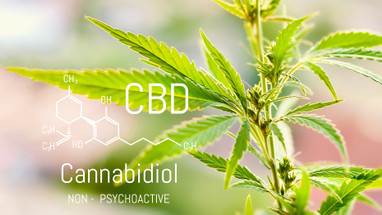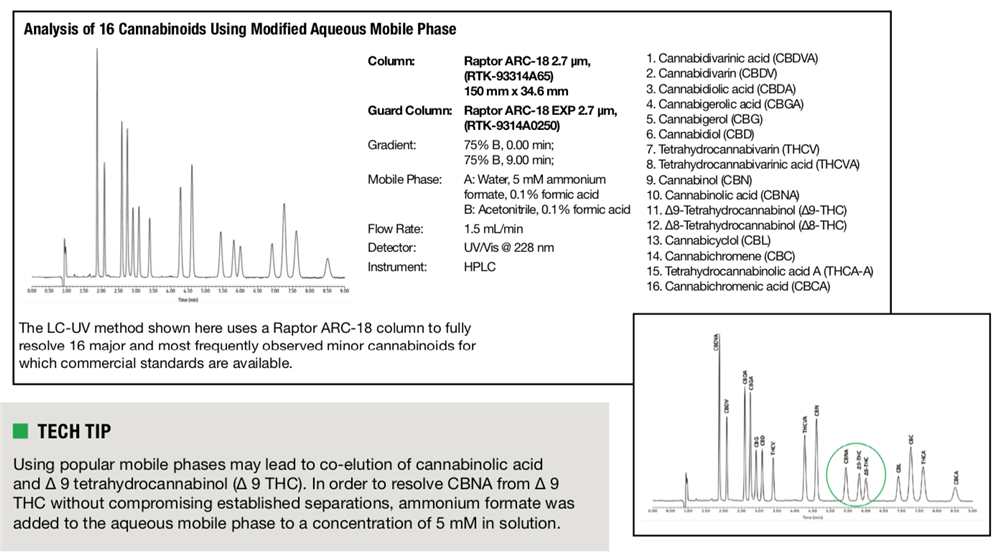Posted by Chrom Tech on 16th Oct 2025
High Throughput Analysis of Cannabinoids by LC-UV Cannabinoid Profiles
As the U.S. cannabis market expands, the need for accurate and efficient cannabinoid profiling continues to grow. According to Gallup, one in seven Americans reports using CBD products—fueling the demand for precise potency testing and reliable analytical methods that ensure compliance and consumer safety.
More than 100 cannabinoids have been identified in cannabis, each contributing to the plant’s unique therapeutic and psychoactive properties. Comprehensive cannabinoid analysis is essential not only for labeling accuracy but also for strain differentiation and product consistency across batches. However, analytical challenges persist—particularly due to interference from minor cannabinoids and terpenes during detection.
Understanding Interferences in LC-UV Cannabinoid Analysis
Many analytical methods focus on separating major cannabinoids such as THC, CBD, and CBN, but may overlook interference from structurally similar compounds. Terpenes, for example, can absorb UV light at 228 nm—the wavelength commonly used to detect cannabinoids—leading to potential overlap and inaccurate quantitation.
These interferences are particularly significant in cannabis concentrates, where minor cannabinoids can become concentrated to detectable levels. A Restek study demonstrated that terpene co-elution may influence the quantitation of CBGA and THCVA under certain conditions. While not currently required for regulatory reporting, accurate quantification of these compounds is vital for method validation and analytical reliability.
Regulatory Testing Requirements
Under California cannabis testing regulations, laboratories must quantify and label the total CBD and THC content of cannabis products. This includes the five most commonly analyzed cannabinoids—THC, THCA, CBD, CBDA, and CBN—each of which must be resolved clearly for accurate reporting. Terpene overlap can compromise this accuracy, emphasizing the importance of robust chromatographic methods.
Optimized LC-UV Method Using Restek Raptor ARC-18
Chrom Tech provides an LC-UV method developed using the Restek Raptor ARC-18 column for fast, high-throughput cannabinoid profiling. This method achieves baseline separation of 16 major and minor cannabinoids—including Δ9-THC, THCA, CBD, CBDA, and CBN—within a 9-minute runtime. By using a simple isocratic mobile phase, the method eliminates gradient complexity, making it easily transferable across instruments and laboratories.
For comprehensive testing, certified extraction solvents and reference standards ensure reproducible results and compliance with state and federal testing standards.
Advantages of Chrom Tech’s LC-UV Cannabinoid Method
- Fast Analysis: Complete separation of 16 cannabinoids in under 9 minutes.
- High Selectivity: Resolves co-eluting cannabinoids and terpene interferences.
- Simple Transferability: Isocratic method compatible with most LC-UV systems.
- Cost-Effective: Reduced mobile phase complexity lowers maintenance and solvent use.
- Reliable Quantitation: Accurate baseline separation for regulated cannabinoid testing.
Partner with Chrom Tech for Cannabis Testing Solutions
Chrom Tech is a Minnesota-based worldwide distributor of chromatography and mass spectrometry supplies. Our extensive product line includes HPLC vials, well plates, syringe filters, and solvent waste containers—all designed to meet the demands of modern cannabis testing laboratories. Contact Chrom Tech to learn how our LC-UV solutions can enhance your lab’s throughput and data accuracy.
Frequently Asked Questions
Why is LC-UV analysis preferred for cannabinoid profiling?
LC-UV is a cost-effective and widely accessible method for quantifying cannabinoids. It provides high resolution and reproducibility without requiring mass spectrometry, making it ideal for routine potency testing in cannabis laboratories.
What cannabinoids can be analyzed using the Restek Raptor ARC-18 column?
This method enables baseline separation of 16 cannabinoids, including major analytes such as THC, THCA, CBD, CBDA, and CBN, as well as frequently observed minor cannabinoids for which commercial standards are available.
How does this method minimize terpene interference?
The optimized LC-UV method uses a Restek Raptor ARC-18 column and isocratic mobile phase, providing enhanced selectivity that separates cannabinoids from terpene peaks that may absorb at the same wavelength.


